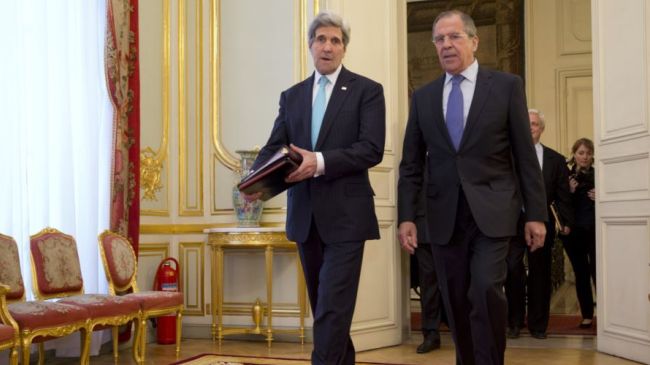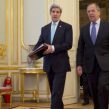
NATO Foreign Ministers Try to Deter a Possible Russian Invasion of Ukraine
Publication: Eurasia Daily Monitor Volume: 11 Issue: 63
By:

The unscheduled meeting in Paris of US Secretary of State John Kerry with his Russian counterpart, Foreign Minister Sergei Lavrov, on March 30, had raised hopes in Moscow that a compromise solution to the Ukrainian crisis may be found (https://www.kommersant.ru/doc/2441781). After annexing Crimea, the Kremlin is demanding constitutional reform in Ukraine—the so called “federalization”—that would create a loose agglomeration in which different regions could pursue separate foreign and economic policies. During the Lavrov-Kerry talks, the pro-Moscow Transnistria secessionist region in Moldova, where Russia still has a military garrison, was also discussed (https://www.ng.ru/world/2014-04-01/7_usa_rf_ua.html). Transnistria is land-locked and sandwiched between Ukraine and the Republic of Moldova. Moscow has been accusing the Moldovan and Ukrainian authorities of “blockading Transnistria”—an accusation the Ukrainian authorities reject as baseless (https://www.segodnya.ua/print/ukraine/v-ukrainu-ne-pustili-293-cheloveka-s-pridnestrovya-506718.html). A Kremlin-financed news site has been calling for Moscow to recognize Transnistria as an independent state and then make it a part of the Russian Federation, just like Crimea (https://www.vz.ru/politics/2014/3/31/679594.html).
The Russian public supports President Vladimir Putin in the annexation of Crimea. A latest poll by pro-Kremlin pollster VTsIOM gives Putin a staggering 96 percent approval for annexing Crimea; 76 percent believe the annexation will benefit Russia, while only 6 percent fear it may cause harm (https://wciom.ru/index.php?id=459&uid=114766). Independent Levada-Tsentr reports that 74 percent of Russians would support the Kremlin in a war with Ukraine and only 13 percent believe such an armed conflict is impossible. Some 77 percent believe the Ukrainian authorities are to blame for the crisis, and only 3 percent blame the Kremlin. Seventy-three percent consider the interim government in Kyiv to be illegitimate. Only 14 percent believe the Crimea annexation may consolidate the Ukrainian nation in opposing Russia. (https://www.rbcdaily.ru/society/562949990996163). Russian troops are poised on the borders of Ukraine, apparently ready to go (see EDM, April 1), and the vast majority of Russians are ready to support an armed invasion, believing that international indignation will bring them no harm.
Some Ukraine-based sources reported this week that Russian troops are partially withdrawing from the Ukrainian border (https://glavred.info/politika/chislo-rossiyskih-voysk-na-granice-s-ukrainoy-umenshilos-smi-275617.html). German Canceller Angela Merkel told journalists Putin promised her a partial troop withdrawal and that she “does not have any grounds not to believe the promise” (https://www.interfax.ru/print.asp?sec=1446&id=368822). The Russian defense ministry announced the withdrawal of one battalion of the 15th mechanized brigade from the Rostov oblast near Ukraine, to its home base in the Samara region on the Volga (Interfax, April 1). It was reported in Moscow that Kerry and Lavrov made progress in Paris and a deal was imminent: The United States would de facto “forgive” the Crimea annexation, recognize Russia as a protector of Transnistria, and put pressure on the government in Kyiv to begin immediately (before the presidential elections planned for May 25) implementing the “federalization” reform. Moscow, in turn, would begin withdrawing troops it has massed on the Ukrainian border (https://nvo.ng.ru/world/2014-03-31/1_lavrov.html). It all turned out to be wishful thinking.
At a meeting of foreign ministers of the North Atlantic Treaty Organization (NATO) in Brussels this week, Secretary General Anders Fogh Rasmussen announced that, in fact, no Russian troop withdrawals had taken place (Interfax, April 1). A Supreme Allied Commander in Europe (SACEUR) staff officer told Jamestown at a background briefing in NATO Headquarters on April 1 that the Russians had some 40,000 troops massed on the Ukrainian border in a heightened state of readiness as an apparent first wave of a future invasion. These troops constitute a balanced force of armor, mechanized infantry, artillery, Mobile Rocket Launcher Systems (MRLS), attack jets, bombers and fighters, as well as logistical and medical units. This intelligence assumption was mostly based on US spy satellite imaginary and was reported by the SACEUR—US Air Force General Philip Mark Breedlove—to Rasmussen.
Also this week, at a press conference in Brussels, Rasmussen used particularly harsh words to castigate Putin: “Russia’s aggression against Ukraine is the gravest threat to European security in a generation. And it challenges our vision of a Europe whole, free and at peace; a vision that we have built since the end of the Cold War” (https://www.nato.int/cps/en/natolive/opinions_108511.htm). But strong language has often been used as a substitute for resolute concrete action. NATO is an alliance of 28 countries, and not all are equally determined to embark on a mission to deter Putin’s version of Russian expansionism. The Moscow press is reporting with satisfaction that influential German political and business leaders are opposing isolating Russia as punishment for annexing Crimea (https://www.rbcdaily.ru/world/562949991007544). After the NATO ministerial ended in Brussels (on April 2), Polish Foreign Minister Radoslaw Sikorsky told Jamestown: “In general, the further a European nation is [from Russia], the calmer it reacts.” This apparent Western indecision is reflected in Russian public opinion. According to Levada-Tsentr, in the beginning of March, some 44 percent feared Russia could face international isolation, but recently the number shrank to 28 percent (https://www.rbcdaily.ru/society/562949990996163).
Last week, Yuri Tereshenko—the acting general director of Ukroboronprom, a state-owned arms producing Ukrainian conglomerate—announced Ukraine was suspending all shipments of arms and other military-connected produce to Russia, “until the conflict deescalates.” “We will lose money, but is it prudent not to arm an enemy,” argued Tereshenko (https://zn.ua/UKRAINE/ukroboronprom-nakonec-to-zamorozil-postavki-oruzhiya-v-rossiyu-142213.html). The Russian defense industry is dependent on Ukrainian-made helicopter and fixed-wing aircraft engines, guided air-to-air missile equipment, SS-18 silo-based intercontinental ballistic missile components, maintenance service and other items. The announcement of a possible Ukrainian arms embargo caused alarm in Moscow (www.ng.ru/armies/2014-03-31/1_nuclear.html).
However, in Brussels, acting Ukrainian foreign minister Andrii Deshchytsia told Jamestown (April 1) there was no decision by the government in Kyiv to impose an arms embargo on Russia and that Tereshenko was merely “expressing an opinion.” According to Deshchytsia, “Ukrainian industry will lose money if they stop trading arms with Russia.” Minister Deshchytsia called for a peaceful resolution of the conflict with Russia and insisted “Ukraine does not want to fight.” At the same time Deshchytsia told Jamestown: “There has been no withdrawal of Russian forces from the border—only some units have been replaced. The government in Kyiv has submitted a list of military-technical equipment it would want to get from the West.” This list has not been published, but Deshchytsia insists there are only nonlethal supplies (no weapons). Apparently the West is nevertheless unwilling to provide Kyiv with any weapons, so as not to offend Moscow.
If the West is hesitant to follow up its strong words with action for fear of offending Moscow, the interim government in Kyiv is in no position to stand up to Putin out of fear this may provoke a massive military response.




